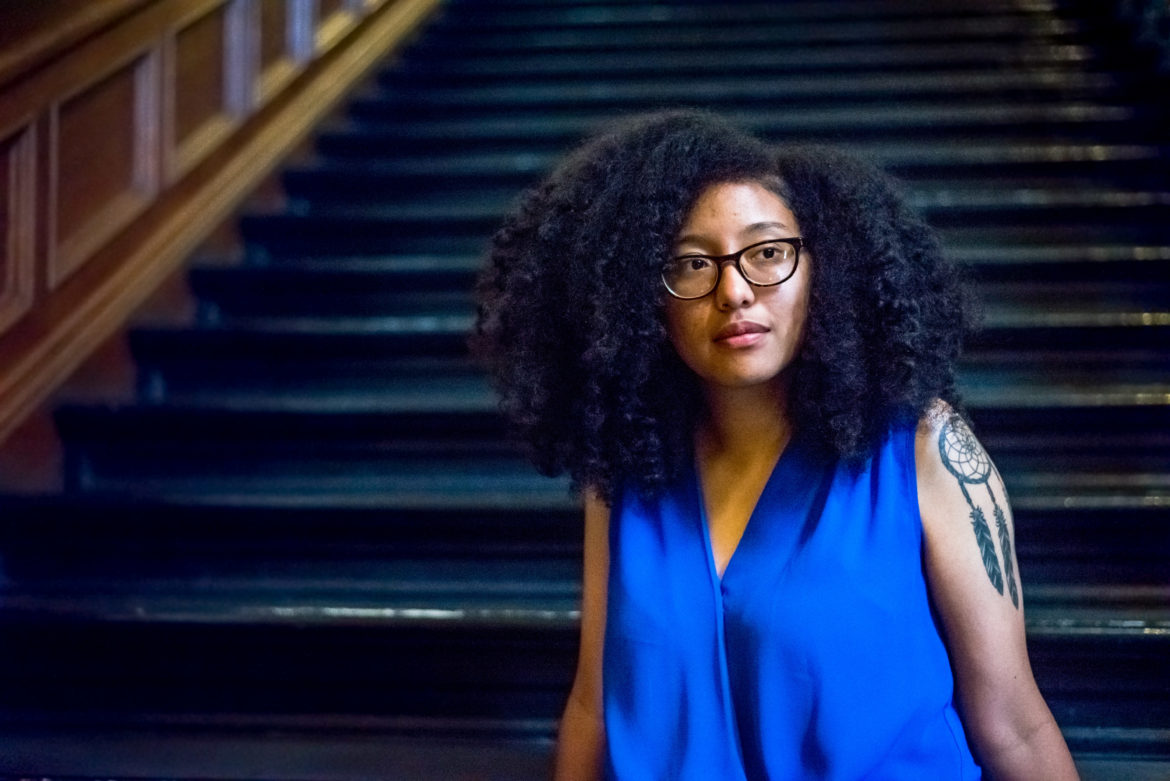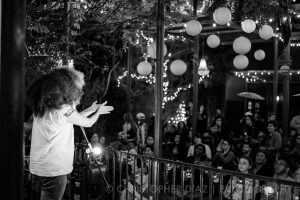The Spiritual Work of Poetry: An Interview with Ariana Brown
by Sampsonia Way / July 5, 2018 / No comments

Ariana Brown, image via http://www.arianabrown.com/photos.html.
Ariana Brown is a Black Mexican American poet from San Antonio, Texas, with a B.A. in African Diaspora Studies and Mexican American Studies from UT Austin. She is the recipient of two Academy of American Poets Prizes and a 2014 collegiate national poetry slam champion. An alum of Brave New Voices, Ariana’s work has been featured in PBS, Huffington Post, Blavity, For Harriet, and Remezcla.
Ariana, who has been dubbed a “part-time curandera,” has performed across the U.S. at venues such as the San Antonio Guadalupe Theater, Harvard University, Tucson Poetry Festival, and the San Francisco Opera Theatre. When she is not onstage, she is probably eating an avocado, listening to Ozuna, or validating black girl rage in all its miraculous forms. Her work is published in Nepantla, Muzzle, African Voices, Borderlands: Texas Poetry Review and ¡Manteca!: An Anthology of Afro-Latin@ Poets from Arte Público Press. She is currently earning an MFA in Poetry at the University of Pittsburgh.
Brown visited City of Asylum Pittsburgh in the fall of 2017 for CoA’s annual Jazz Poetry Festival. She talked with Sampsonia Way about her recent transitions- from San Antonio to Pittsburgh, performance to workshop, and stage to page.
You have recently transitioned from performing a lot of your work, to being in the MFA program at the University of Pittsburgh, where a lot of writing is happening on the page. How has that been for you?
It’s definitely different because before, when I worked with poets and was workshopping poems, there was always the intention, and the primary focus that the poem was going to be read on a stage, in front of people. Usually, the poets I have worked with were also coming from similar disciplinary backgrounds, so transitioning to an MFA program, where folks are not necessarily thinking about what the poem will exist as in a performance context, is a little jarring. But I definitely came to the MFA program interested in the possibilities of the page. I think you can do things on the page that you can’t do on the stage and vice versa, so I am learning a lot about what is possible within the limits of the page.
I think one of the most beautiful things about spoken word and about the slam scene in different cities around the country is that sense of community– if a poet gets a low score, it’s the judges who get boo-ed. Everyone in the room is always pulling for the performer. Have you found that kind of mentality in workshops and in communities of page writers as well?
Not necessarily in the MFA program, but I do, during the school year, try and do at least one out-of-town show at a college or university. Then I’m working with college-age students, and if I teach a writing workshop, I’m very interested in high levels of engagement. I have a friend who says she’s from Team Clap-A-Lot, [laughs] so we clap for everybody. Lots of clapping, lots of call-and-response. I live for those things and I kind of do miss that. In an MFA program, no one is shouting encouraging chants before I read my poem in the workshop space. It’s a little different.
You have also transitioned to living here in Pittsburgh. Your writing is very tied to your identity, do you feel that your writing is tied to place? Has it been different writing in this Steel Town, where it snows all the time, in this grey environment, rather than in San Antonio or elsewhere in Texas?
I definitely feel like a lot of my writing is tied to San Antonio, Texas in particular, and to the Southwest in general. I keep thinking about how much I miss seeing cacti everywhere, which I never thought would happen, you know? It just wasn’t something I thought about. It’s because I feel like a lot of my work and my identity is tied to the regional Southwest. I don’t perform as often here in Pittsburgh, because a lot of the things that I’m talking about don’t relate. There are lot of the things that I’m sort of critiquing within my community, and my community is not here. I definitely feel like some of my poems don’t translate. A lot of the poems that are really important to me, this is not necessarily the setting to share them in. So, yeah, it’s definitely influenced me in that way. I can’t say that I’ve written anything about Pittsburgh, yet. I think that’s because I feel a little disconnected to the physical landscape. I don’t see cacti anywhere here, there’s not wild rosemary growing. I’m still adjusting to what it’s like being here as a writer.

Photo by Christopher Diaz.
Turning to your work– you’ve been dubbed a part-time curandera and I was curious about that relationship for you, and the ways that your work as a curandera comes into the poetry. Do you feel that writing is somewhat based in ritual for you?
I definitely feel like writing and performing is ritual. My curandera once told me that poetry is ceremony. I was explaining to her that when I go to these national slam competitions, I feel so alive, like all of my senses are engaged, and I feel very present the whole time. When I told her that, she responded, Well poetry is ceremony. You know, it makes sense that you would feel that way. My homie from Tucson called me a part-time curandera, and I do feel like, when you memorize a poem and the poem lives in your body, and you go on a stage and you prepare yourself to share that poem, you have to prepare your body as a vessel. And you’re doing spiritual work, because you’re recalling all of the emotions that caused you to write the poem, and then you’re engaging with an audience, so there is an exchange of energy that’s also happening. There are all these sort of processes that are almost impossible to measure and to explain, but it’s all about feeling and connecting, and I think that is essentially spiritual work. I think you have to be aware of what energies you’re calling forth and what energy that you bring into the room and the ancestors that are present with you. I think it has to be deliberate, otherwise it can be irresponsible. I think that my favorite writers and performers are people who are very aware of what they’re doing with the energy in the room.
How do you think about that connection and that exchange of energy in terms of writing a poem down, or sending a book out into the world?
I think a lot about physically writing poetry. There’s this connection when someone reads your book that you may never consciously know about.
Definitely. Is that on your mind as you’re physically putting the book together, and crafting your ideas?
That’s interesting. I write a lot on my laptop, so I don’t necessarily have that close relationship with my journal anymore. I’m that weird age, where you kind of have a relationship to written objects, and then you also have a relationship with technology and creating work that way. It doesn’t feel quite as tangible typing keys on a laptop or on a Google doc to make a poem. As I’m writing, I’m often speaking allowed what is being written. I think that’s because I have a background in performance. That’s part of my process, is figuring out how things sound. In terms of what spiritual work is happening as I’m creating a poem, I’m thinking a lot about what I need, and writing a poem that can service that need in some kind of way. I think that is just part of my general process of writing, asking, What is it that Ariana needs that she’s not getting from people, or from the environment, or whatever? What thing needs to be addressed? And then figuring out how a poem can fulfill that need. So maybe it’s the content, more than the process, that feels spiritual to me.
When you memorize a poem and the poem lives in your body, and you go on a stage and you prepare yourself to share that poem, you have to prepare your body as a vessel… you’re doing spiritual work.
Turning to your work in the classroom: can you talk about what you try to bring to the classroom? When you’re working with other young poets, what are some things that are really important to you that you want students to get out of a class or workshop?
In a workshop setting, for me it’s a lot about being aware of the energy again. Teaching, even, is a kind of performance. It’s making sure everyone feels safe and prepared to engage, that they feel that this is a space that they can inhabit freely, no matter what their background with writing is, or what their background with language is. That they can say what they need to say, but also be responsible for the things that they have to say. That’s sort of priority number one for me, and then from there it’s also about showing the possibilities of what can happen when you sit down and write, you know? When you sort of invest in yourself that way, and believe that what you have to say is valid because you say it’s valid, that that can be enough. And so, a lot of my writing workshops are focused on empowerment and healing. Acknowledging that everyone comes into the room with some kind of baggage, some kind of thing that they’re working through or on, and that we can use writing as a way to work through it.




